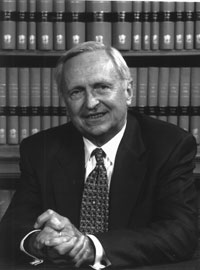RONALD
BRESLOW

S.L. Mitchill Professor of
Chemistry and University Professor
Education
B.A., Chemistry, Harvard
University, 1952
M.A., Harvard University, 1954
Ph.D., Harvard University, 1955
Postdoctoral Research
NRC Fellow, Cambridge
University, 1955
Contact
Biographical Sketch
Ronald Breslow was born in
Rahway, New Jersey on March 14, 1931. He received his undergraduate and
graduate training at Harvard University, where he did his Ph.D. research with
Professor R.B. Woodward. He then spent a year in Cambridge, England as a
postdoctoral fellow with Lord Todd, and came to Columbia University in 1956 as
Instructor in Chemistry. He is now the Samuel Latham Mitchill Professor of
Chemistry at Columbia and one of twelve University Professors, and a former
Chairman of the Department.
Professor Breslow's research
interests can be described generally as involving the design and synthesis of
new molecules with interesting properties, and the study of these properties.
Examples include the cyclopropenyl
cation, the simplest aromatic system and the first aromatic compound
prepared with other than six electrons in a ring.
His work establishing the
phenomenon of anti-aromaticity has involved the synthesis of novel molecules,
as well as their study. Even in work on purely mechanistic questions, such as
his discovery of the chemical mechanism used by thiamine (vitamin B-1) in biochemical
reactions, the synthesis and study of novel molecules played an important role.
Although he continues his
interest in unusual conjugated systems, his major emphasis in recent years has
been on the synthesis and study of molecules that imitate enzymatic reactions.
This work has included the development of remote
functionalization reactions and the development of artificial enzymes.
Recently he has developed a
new group of cytodifferentiating agents with potential use in cancer
chemotherapy. He is the author of over 400 publications.
Awards and Professional Service
Professor Breslow is a member
of the U.S. National Academy of Sciences (Chairman of the Chemistry Division 1974-77),
of the American Academy of Arts and Sciences, of the European Academy of
Science, and of the American Philosophical Society (member of the Council,
1987-92), as well as other scientific societies including the New York Academy
of Sciences. He is a Foreign Fellow of the Indian National Science Academy, an
Honorary Member of the Korean Chemical Society, , an Honorary Member of the
Royal Society of Chemistry of Great Britain, a Foreign Member of the Royal
Society of Britain, a Fellow of the World Innovation Foundation, and an
Honorary Member of the Chemical Society of Japan. He also has an honorary
professorship at the University of Science and Technology of China.
He has been the Chairman of
the Board of Scientific Advisors of the Alfred P. Sloan Foundation, and a
member of the Board of Trustees of Rockefeller University. He is on the
Editorial Board of a number of Scientific Journals, and has held over 150 named
and visiting Professorships.
His major scientific awards
include the American Chemical Society Award in Pure Chemistry (1966), the
Fresenius Award of Phi Lambda Upsilon (1966), the Baekeland Medal (1969), the
Centenary Medal (1972), the Harrison Howe Award (1974), the Remsen Prize
(1977), the Roussel Prize in Steroids (1978), the James Flack Norris Prize in
Physical Organic Chemistry of the American Chemical Society (1980), the
Richards Medal (1984), the Arthur C. Cope Award (1987), the Kenner Award
(1988), the Nichols Medal (1989), the National Academy of Sciences Award in
Chemistry (1989), the Allan Day Award (1990), the Paracelsus Award and Medal of
the Swiss Chemical Society (1990), and the U.S. National Medal of Science
(1991). He was named one of the top 75 contributors to the chemical enterprise
in the past 75 years by Chemical & Engineering News (1997), and won the Priestley Medal
(1999). In 2000 he won the New York City Mayor's Award in Science and in 2002
he received the ACS Bader Award in Bioorganic or Bioinorganic Chemistry and the
Esselen Award for Chemistry in the Public Interest. He won the Welch Award in
Chemistry in 2003 and the Willard Gibbs Award in 2004. From Auburn University
he received the Kosolapoff Award (2005), the Othmer Gold Medal from the
Chemical Heritage Foundation and the Paul Gassman Medal from the Organic Division
of the American Chemical Society in 2006, and in 2007 he was awarded the
Organic Syntheses/Wiley Award.
He has also received the Mark
Van Doren Medal of Columbia University and the Columbia University Great
Teacher Award. He was President-Elect of the American Chemical Society (1995),
was ACS President (1996), and was ACS Immediate Past President (1997).